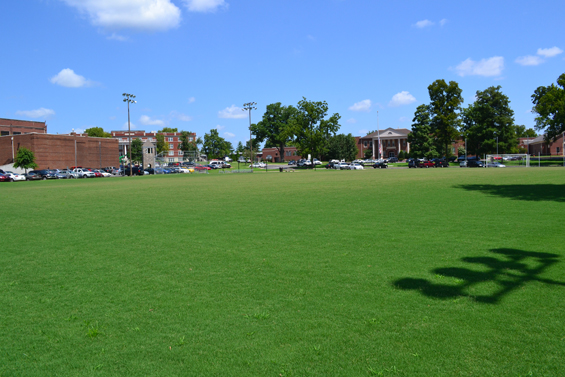As a heat advisory for Middle Tennessee has been issued until Sunday at 7 p.m., Lipscomb Athletics assistant strength and conditioning coach Sean Johnson discussed the necessary precautions to take when exercising or working outside in extreme heat.
Johnson, who began working with Lipscomb Athletics the spring of 2016, said the most important thing to do when outside in extreme heat is to make sure to drink plenty of water throughout the day and to consume electrolytes during exercise.
Another precaution to take is to wear light-colored, loose-fitting clothing. For exercise specifically, moisture-wicking, quick-drying gear is best, such as Nike Dri-Fit, and wearing light-colored clothing will reflect the sun, rather than absorb it. Sunscreen is also essential for protecting one’s skin.
Johnson said the guidelines for Lipscomb sports teams vary, but he recommends checking the weather beforehand and planning to exercise or practice during a part of the day when the humidity is low.
“If we are going to train outside, it is best to do it early in the morning — 5:30 or 6 a.m. — before the sun gets too hot or late in the evening when the sun is going down,” Johnson said. “It’s kind of up to each coach as to when they want to practice, but they try to avoid the hottest parts of the day when they can.”
This week has been one of the hottest of the summer. In addition to high humidity levels, the temperature reached 98 degrees in Nashville today. A 60% chance of rain is expected tomorrow, which will cool temperatures slightly, but the highs will stay in the 90s for the majority of the week.
“A good rule of thumb is to avoid the hottest part of the day, and if there is a heat advisory for the day, I would avoid training outside,” Johnson said. “If you work outside, find shade and take frequent breaks, and, again, drink plenty of water and electrolytes throughout the day.”
Johnson noted that taking precautions when exercising or working in extreme heat is incredibly important, yet it is also necessary to remember to cool down properly afterwards to avoid heat-related illnesses as well.
“Anytime you exercise, it’s recommended to get our heart rate back down below 120 beats per minute before you stop completely,” Johnson said. “This can be done usually by walking three to five minutes before stopping your exercise session. If this is done in the heat, it might take longer for your heart rate to come back down, depending on how well of shape you’re in. An easy way to check your heart rate is to find your pulse and count the beats for 15 seconds and multiply by four.”
Photo courtesy of Lipscomb University

